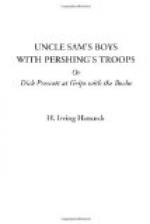“It is quiet here, after the Hun assault of this afternoon,” explained the French major when the Americans had been presented. “Captain Ribaut, you are taking our American comrades to the front line?”
“That is my instruction, Major.”
“It is well, and I think you will find it quiet enough to-night for a study of the Hun line. Still one can never say.”
A brief conversation, and the visitors returned to the outer air, where Private Berger awaited them. At the second line trench, which held the supporting troops for the first line, Ribaut took them to the captain of French infantry in command at that point.
“I will send Lieutenant De Verne with you,” said the captain, and passed the word for that officer.
“Show our American comrades everything that can possibly interest them,” was the captain’s order.
“I shall do my best, my captain,” replied the lieutenant. “But I do not know. The Huns are as quiet, to-night, as though they had tired themselves to death this afternoon.”
Turning to Private Berger, Lieutenant De Verne added:
“You may find your way into one of the dugouts if you like, as you will hardly be needed for hours.”
“But my orders, my lieutenant, were to remain with the American party,” protested Private Berger mildly.
“Oh, very well, then,” replied De Verne carelessly.
This time, instead of leading the way, Private Berger brought up the rear.
“You will do well to talk in low tones,” the French lieutenant cautioned them in whispers, “for, when we enter the front line trench we shall be only about a quarter of a kilometer from the Huns’ first line trench.”
With that they started forward. A short stroll through a communication trench brought them to the first line ditch. As the ground was wet here duck-boards had been laid to walk on. The parapet was piled high with bags of sand through which loop-holes had been cunningly contrived for the French sentries who must watch through the night for signs of Hun activity. Over the rear wall of the trench was another built-up wall of sand-bags. This parados, as it was called, is intended to give protection against shrapnel, which often burst just after passing over a trench. Thus the parados prevents a back-fire of the bullets carried in the shrapnel shell, which otherwise might strike the trench’s defenders.
“You may stand up here on the fire platform, if you wish,” whispered Lieutenant De Verne to Dick in English. “If you do not think it too foolish to expose yourself, you will be able to look over the top of the parapet. First of all you will see our lines of barbed wire fencing and entanglements. Beyond the wire you will see open ground, much torn by shell-holes. Further still you will see the wire defenses of the German first trench, and then the parapet that screens the enemy from your gaze.”




